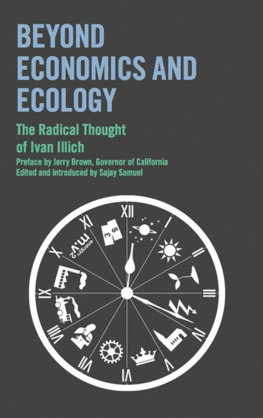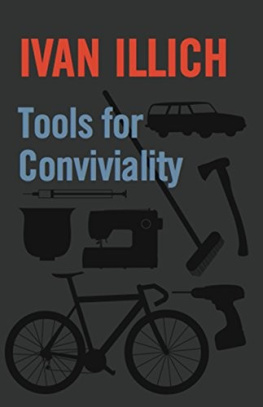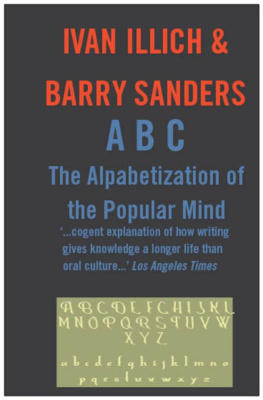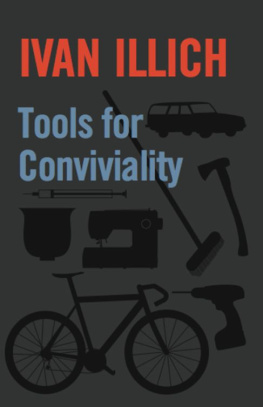Ivan Illich - Gender
Here you can read online Ivan Illich - Gender full text of the book (entire story) in english for free. Download pdf and epub, get meaning, cover and reviews about this ebook. City: London, year: 2011, publisher: Marion Boyars, genre: Home and family. Description of the work, (preface) as well as reviews are available. Best literature library LitArk.com created for fans of good reading and offers a wide selection of genres:
Romance novel
Science fiction
Adventure
Detective
Science
History
Home and family
Prose
Art
Politics
Computer
Non-fiction
Religion
Business
Children
Humor
Choose a favorite category and find really read worthwhile books. Enjoy immersion in the world of imagination, feel the emotions of the characters or learn something new for yourself, make an fascinating discovery.
- Book:Gender
- Author:
- Publisher:Marion Boyars
- Genre:
- Year:2011
- City:London
- Rating:3 / 5
- Favourites:Add to favourites
- Your mark:
- 60
- 1
- 2
- 3
- 4
- 5
Gender: summary, description and annotation
We offer to read an annotation, description, summary or preface (depends on what the author of the book "Gender" wrote himself). If you haven't found the necessary information about the book — write in the comments, we will try to find it.
Gender — read online for free the complete book (whole text) full work
Below is the text of the book, divided by pages. System saving the place of the last page read, allows you to conveniently read the book "Gender" online for free, without having to search again every time where you left off. Put a bookmark, and you can go to the page where you finished reading at any time.
Font size:
Interval:
Bookmark:
The footnotes have been composed for my students in a course at Berkeley in Fall 1982, and for those who want to use the text as a guide for independent study. Each titledfootnote is meant as a reading assignment, as a tangent to the text, as a doorway to further research. Generally, I selected books I would like to discuss with my students, and starred a few that are of more general interest. Some items I included mainly because of the bibliography they contain, or for the guidance they provide to the history, the present status of research, and the controversy on the issue. These footnotes are not meant to prove but to illustrate and qualify my arguments ; they are marginal glosses written in counterpoint to the text, outlines of my lectures to students who have prepared themselves by reading this book. The notes relate to the text as formerly questionsdisputatae related to the summa.
1. Vernacular Values
2. Key Words
3. Word Fields
4. The Human
5. Genderless Individualism
6. Invidious Individualism
7. Sex and Sexism
8. Environmental Degradation
9. Counterproductivity
10. The Recovery of the Commons
11. Scarcity
12. Duality
13. Work and Sex
14. The Widening Wage Gap
15. Statistics on Discrimination
16. Egalitarian Rituals
17. Women and Law
18. Women in Socialist Countries
19. Women and Recession
20. Sexist Rape
21. Patriarchy and Sexism
22. Reproduction
23. The Unreported Economy
24/25. The IRS Confused
26. Under-reporting: Economic Versus Political
27. New Home Economics
28. Illegitimate Unemployment
29. Disintermediation
30. Shadow Work
31. Housework
32. The Housewife
33. Economic Anthropology
34. Mystification of Shadow Work
35. The Valium Economy
36. Household Machinery
37/42. Unpaid Work
43. The Self-Service Economy
44. Discrimination in Self-Help
45. Womens Studies
46. Stereoscopic Science
47. Modernization of Poverty
48. Women and Economic Development
49. Development of International Housework
50. Wrecked Singles
51. Vernacular
52. Complementarity and Social Science
53. Right and Left
54. Sexism: Moral and Epistemological
55. Yin and Yang
56. Metaphors for the Other
57. Ambiguous Complementarity
58. Socio-Biological Mythology
59. Animal Sociology
60. The Racist and the Professional
61. Role
62. Social Morphology
63/64. Sex Role
65. Victorian Feminism
66. Sex and Temperament
67. Role Complementarity
68. Feminine Subordination
69. The Gender Divide
70. Tools and Gender
71. Division of Labor
72. The Elite and Gender
73. Rent and Gender
74. Trade and Gender
75. Craft and Gender
76. Structuralism
77. Economic Wedlock
78. Milieu and Domain
79. Space/Time
80. The Sexed Body
81. Rough Music
82. Probity
83. Gossip
84. Asymmetric Dominance
85. The Subject of History
86. Housing and Dwelling
87. From the Delivery of the Mother to the Delivery of the Child
88/89. Asymmetry of the Symbolic Universe
90. Nature/Culture
91. Anthropology
92/93. Sex Difference in Language
94. Complementarity in Speech
95. Womens Language
96. Subordination in Speech
97. Role in Speech and Role in Language
98/102. Gendered Speech vs. Sexist Language
103/104. Anastomosis
105. Disregard for Gender in Calamity
106. Intrusion into the Other Domain
107. Political Defiance of Gender
108. Mocking Sanctions
109. The Language of Travesty
110. The History of the Heterosexual
111. Sodomy and Heresy
112. Care: Professional and Clerical
113. Alma Mater
114. Sin
115. Conscience
116. The Madonna
117. Religiosity
118. The Devil
119. The Witch
120. The Civilization of Broken Gender
121. Family History
122. Capitalism
123. The Industrial Revolution
124. The Loss of Rural Gender
125. The Proto-Industrial Interstice
T he break with the past, which has been described by others as the transition to a capitalist mode of production, I describe here as the transition from the aegis of gender to the regime of sex. In this book I sum up the position I reached in a conversation with Barbara Duden, and which grew out of a controversy between us. Originally, the issue was the economic and anthropological status of nineteenth-century housework. I have dealt with this in ShadowWork. with Lee Hoinacki was of a different kind. As at other times during the last two decades, we met to report to each other on what we had learned during the past year. We spent two weeks on his homestead and he reviewed my draft. While discussing and writing with him there and, later on, in Berlin, my text took on a new shape. Our conversations were frequently interrupted by laughter and the expressed desire that the reader come to share the pleasure we found in writing. I cannot say who finally turned any given phrase the way it now stands. Without his collaboration, I certainly would not have written this text.
In this book I have taken up the substance of several lectures that were part of my course on the social history of the twelfth century when I was a guest professor at the University of Kassel (19791981). I remember with gratitude Ernst Ulrich von Weizscker , Heinrich Dauber, and my students for their patient and courageous criticism.
I especially want to thank several people for what they have contributed through their conversations with me. Norma Swenson made me recognize the main weakness of MedicalNemesis, published in 1975: its unisex perspective. The reflections of Claudia von Werlhof on the blind angle of economicperception led me to distinguish its two faces, the shadow economy and the vernacular domain, both equally neglected but not equally denied. The distinction between vernacular and industrial topology on which I build I owe to Sigmar Groeneveld. Conversations with Ludolf Kuchenbuch have led me to new insights on the history of the conjugal couple. I have received invaluable encouragement from my old friends Ruth and Lenz Kriss-Rettenbeck (both ethnographers and art historians), with whom I share several teachers in the period between Hugo of St. Victor and Gustav Knstler. Part of my research was done while a fellow at the Institute for Advanced Studies in Berlin. Susan Hunt worked with me on this manuscript while preparing her reader on gender and sex, now available from Rt. 3, Box 650, Dexter, ME 04930, USA.
I dedicate this book to Joseph Fitzpatrick, S.J., on his seventieth birthday. For thirty years he has tried to teach me sociology.
Cuernavaca, 1982
VERNACULAR VALUES
Under the title ShadowWork (Boston and London: Marion Boyars, Inc., 1981, US Distributor: The Scribner Book Companies, Inc.) I have published five essays, of which the second and the third deal with the contrast between vernacualr language and taught mother tongue. These essays are the result of long conversations with Professor D. P. Pattanayak, while I was studying under his guidance at the Central Institute of Indian Languages , Manasagangotri, Mysore 570006, India. For background, see Devi Prassad Pattanayak, AspectsofAppliedLinguistics (New York: Asia Publishing House, 1981). For further research on this distinction, request the proceedings of the International Seminar In Search of Terminology (January 1982) from the above address. My two papers will become chapters of a book to be called
Font size:
Interval:
Bookmark:
Similar books «Gender»
Look at similar books to Gender. We have selected literature similar in name and meaning in the hope of providing readers with more options to find new, interesting, not yet read works.
Discussion, reviews of the book Gender and just readers' own opinions. Leave your comments, write what you think about the work, its meaning or the main characters. Specify what exactly you liked and what you didn't like, and why you think so.









